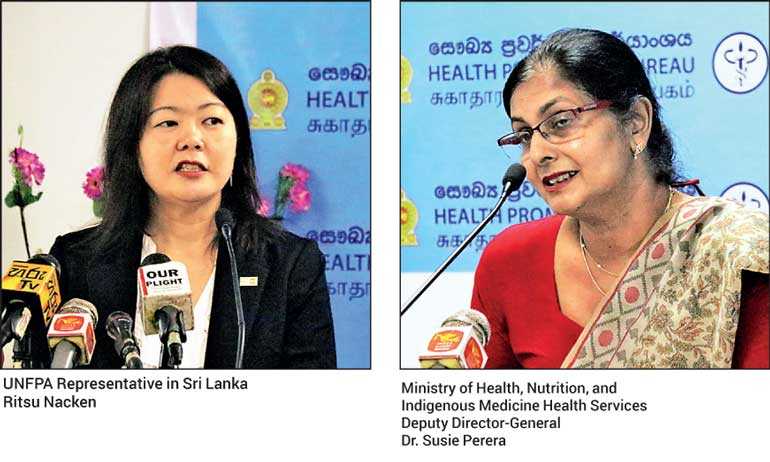Friday Feb 27, 2026
Friday Feb 27, 2026
Saturday, 3 October 2020 00:02 - - {{hitsCtrl.values.hits}}

Group photograph of dignitaries and speakers
Access to safe, voluntary family planning is a human right; which can save lives and have the effect of promoting healthier populations, a society that achieves gender equality and stronger economies. Yet, an estimated 217 million women worldwide are unable to access information and services related to their sexual and reproductive health and reproductive rights.
On average, one in three Sri Lankan women face unplanned pregnancies due to the same.
In order to mark The National Family Planning day which is celebrated annually on 26 September, coinciding with the World Contraception Day, the Health Promotion Bureau held a Press conference and media seminar under the topic “A Happy Family with Optimal Birth Spacing” on the 25 September with the participation of The United Nations Population Fund (UNFPA) and the World Health Organization (WHO) alongside various branches of the Ministry of Health and civil society organizations.
The conversation spanned around empowering individuals and couples to plan whether and when to have children, which enables their families, particularly women and girls, to reach their full potential. Speakers touched on important topics such as subfertility, the need to invest in rights-based family planning, improving comprehensive sexuality education, and reducing unsafe abortions.
Although family planning services are often seen as a taboo topic surrounded by myths and misconceptions, they are offered to give individuals and couples the power of choice; to achieve optimal spacing between pregnancies according to their physical, mental and financial wellbeing.
This is why it is vital to reframe the narrative and disseminate scientifically accurate information on family planning.
According to the Demographic and Health Survey (2016), 35% of married women in Sri Lanka do not use contraception. Teenage pregnancies are at a rate of 4.6% with sub-national disparities of 5%-8%. As a result, it is estimated that 650 unsafe abortions take place daily in Sri Lanka, with no recent evidence of a decline and 80% are estimated to be accessed by married women above the age of 30. The lack of recent up to date data indicates that despite legal restrictions, unsafe abortions continue to risk the lives of many women and girls. Family planning can change this situation by providing women and girls choices for their future.

The Director of Health Maternal and Child Health at the Family Health Bureau, Dr. Chitramalee de Silva addressed the media and stated, “It is crucial that we concentrate our efforts on providing voluntary family planning services while ensuring that we curb unsafe abortions, stillbirths and maternal mortality.” Also speaking at the press briefing, representative of the United Nations Population Fund (UNFPA) in Sri Lanka, Ritsu Nacken stated, “Access to safe, voluntary family planning and contraception is a human right that is vital to achieve gender equality and elevate millions of women and girls from poverty. Especially during emergencies such as the COVID-19 pandemic, access to family planning has to be maintained as essential services.”
In 1994, in Cairo at the landmark International Conference on Population and Development (ICPD), 179 governments – including Sri Lanka – agreed that sexual and reproductive health and women’s empowerment are intertwined and at the heart of sustainable development.
Ending unmet need for modern methods of family planning is a cornerstone of this ICPD Programme of Action.
UNFPA is a key partner in the FP2020 global partnership to empower women and girls by investing in voluntary and rights-based family planning, and works with the Government of Sri Lanka to strengthen the capacity of health care providers to deliver quality family planning services and to develop a national subfertility package.
UNFPA also helps increase the capacity of pre-and-in service teachers to deliver comprehensive sexuality education in schools.